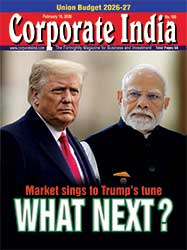Want to Subscribe?
Read Corporate India and add to your Business Intelligence

![]() Unlock Unlimited Access
Unlock Unlimited Access

Published: February 15, 2024
Updated: February 15, 2024
Shaktikanta Das, Governor of the Reserve Bank, the central bank of the country, has stunned the world of business, information technology, finance and fintech by ordering Paytm Payments Bank to virtually pack up – on account of persistent non-compliances — prohibiting the bank from taking fresh deposits or credits, or processing top-up transactions in its customer accounts.
The RBI move is a shocker, as Paytm is after all an innovative marvel of financial technology ecosystem. Which has made India proud. If India has made tremendous progress in the field of digital revolution, in fintech, Paytm’s contribution in this achievement has been the most prominent. Had fintech whiz kid Vijay Shekhar Sharma been born in Europe or the US, he would have been a billionaire today, besides being feted widely. Today, this poster boy of the Indian fintech revolution must be down in the dumps over fate of his dream child.
Of course, everyone is equal before the law, and if Mr Sharma is found guilty of financial misdemeanours, he and his companies should face the consequences. But the RBI has not raised any questions over Mr Sharma personally or the working of Paytm, which is known as One97 Communications.
Little wonder that financial experts have questioned the RBI’s strictures against Paytm Payments Bank. Observers across the board — fintech evangelists, start-up founders and supporters, customers of Paytm, its business partners and investors, have failed to understand why PPBL is being hounded. The RBI has offered few reasons for clamping down on PPBL, except to refer to ‘persistent non-compliances and supervisory concerns’.
Scattered media reports have claimed that PPBL stands accused of being party to thousands of fake accounts, money laundering and dodgy related-party transactions. Paytm has flatly denied these allegations, while the RBI has remained silent. Is it not the duty of the RBI to share information on such a vital issue? Knowledgeable observers claim that the RBI never believes in giving full information – whether it is reducing the terms of directors on bank boards or penalizing entities in breach of rules. Even when it does offer some specifics, it often refrains from detailing the scope or severity of the violation. Even last year, when the RBI levied a huge penalty of $ 650,000 (Rs 54 million) on PPBL for some violations, its order was silent on the scale of the contraventions. It may be noted that internationally, banking regulators make detained disclosures when taking punitive action. Even at home, when Securities and Exchange Board of India (SEBI), the regulator of the securities market, issues punitive orders, it provides details of ‘what, how, why, and what next’! The RBI clearly does not believe in such disclosures.
Does the RBI realize that because of its fiat against PPBL, over 50 million merchants are at a loss over what to do now. Most of them cannot afford credit card fees or brick-andmortar infrastructure. For a majority of them, online payments are synonymous with the Paytm app connected to a PPBL account. The million-dollar question for them is how to accept non-cash payments now. Observers wonder how the regulator ended up ignoring the very reason why it allowed this category of banks to exist in the first place.
Punitive action means that a serious crime has been committed. But who has committed the crime and who is being punished? Paytm’s top management and the board of directors of PPBL are totally untouched, while the real sufferers will be users and particularly 50 million merchants. Is it their fault that they enthusiastically joined an innovative digital revolution that has brought praise to the country?
Bloomberg columnist Andy Mukherjee has come forward with an enlightened and practical suggestion. He says, “Instead of creating confusion for millions of wallet customers and account holders, shouldn’t the regulator have devised a more orderly resolution?” On a related note, as Bhargavi Zaveri-Shah, doctoral researcher at the National University of Singapore’s Faculty of Law, points out, the RBI’s opacity not only has an adverse effect on stakeholders but the absence of a reasoned and transparently disseminated order jeopardises the RBI’s own independence – as it is generally easier to assert independence with transparent decisions.

February 15, 2026 - First Issue

Industry Review

Want to Subscribe?
Read Corporate India and add to your Business Intelligence

![]() Unlock Unlimited Access
Unlock Unlimited Access
Lighter Vein

Popular Stories
Archives
